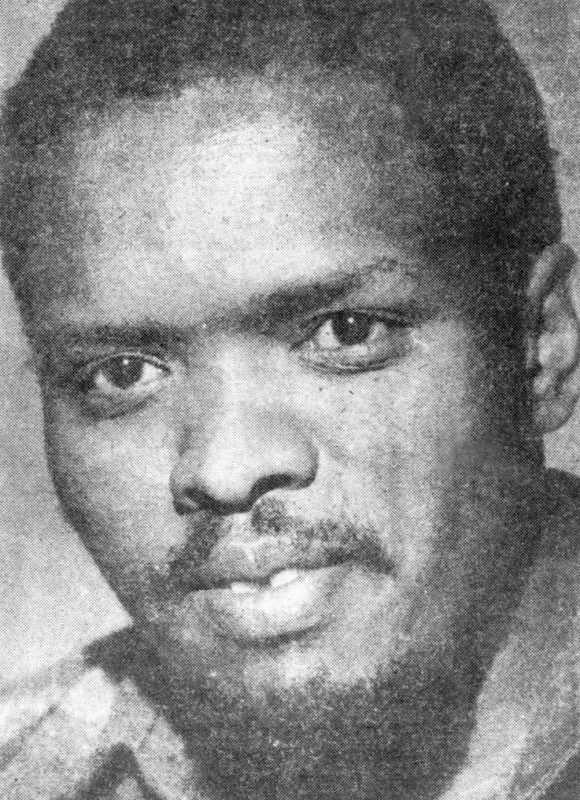PIONEER
Steve Biko

Anti-apartheid activist | Philosopher | Black Consciousness Movement Leader
Born: 18 December 1946 Died: 12 September 1977
“Essentially to answer [the] problem ... that the black man is a defeated being who finds it very difficult to lift himself up by his bootstrings. He is alienated ... He is made to live all the time concerned with matters of existence, concerned with tomorrow ... Now, we felt that we must attempt to defeat and break this kind of attitude and to instil once more a sense of dignity within the black man. So what we did was to design various types of programmes, present these to the black community with an obvious illustration that these are done by the black people for the sole purpose of uplifting the black community. We believe that we teach people by example.”
Who is
Steve Biko?
Leader of the Black Consciousness Movement (BCM) and founder of the South African Students’ Organisation (SASO) who was killed while in police custody.
Professions
and Roles
Anti-apartheid activist, African nationalist, writer and leader of the BCM.
Best Known For
Biko was a popular voice of black liberation in South Africa during the 1960s and 1970s. He was one of the most recognisable leaders of the BCM, and launched SASO.
Life highlights
- Biko was expelled from his high school, Lovedale, after being interrogated by the police about his brother Khaya’s political activities.
- He was admitted to Durban Medical School at the University of Natal Non-European section (UNNE) in 1966. There he was elected to the Students’ Representative Council (SRC) in his first year, and became involved in the National Union of South African Students (NUSAS) politics.
- Biko was instrumental in the founding of SASO in 1968, and was elected its first president in 1969. He was elected Chair of SASO Publications in July 1970, and began to publish articles as Frank Talk (a pseudonym) under the heading ‘I Write What I Like’, in the SASO newsletters.
- He became very active in the Black People’s Convention (BPC) in the early 1970s, and served as its youth coordinator.
- Biko was barred from medical school in 1972 due to his political activism, and enrolled in various courses at the University of South Africa (UNISA) in 1973 to study law and political science.
- In March 1973, he was banned by the state and confined to the magisterial district of King William’s Town. While confined, Biko still managed to set up an office for the BCM there. He also set up the Ginsberg Educational Fund to support student bursaries, as well as the Zanempilo Health Clinic, which would become a hub of BCM activities. He was still highly active in the everyday operations of BCM despite being banned.
- Biko was arrested in 1975 and detained for 137 days without being charged or tried. His banning order tightened in 1976 so he could no longer operate as the BCM director. He was then arrested on 27 August 1976 and held in solitary confinement for 101 days.
- In August 1977, after breaking his banning order, he was detained once again. He was severely beaten in police custody and sustained a brain haemorrhage. Biko died alone in his cell some time during the night of 12 September 1977.
IN THEIR OWN WORDS
“Black consciousness is in essence the realisation by the black man of the need to rally together with his brothers around the cause of their oppression – the blackness of their skin – and to operate as a group in order to rid themselves of the shackles that bind them to perpetual servitude. It seeks to demonstrate the lie that black is an aberration from the ‘normal’, which is white. It is a manifestation of a new realisation that by seeking to run away from themselves and to emulate the white man, black people are insulting the intelligence of whoever created them black. Black consciousness therefore takes cognisance of the deliberateness of God’s plan in creating black people black. It seeks to infuse the black community with a new-found pride in themselves, their efforts, their value systems, their culture, their religion, and their outlook on life.”
– Steve Biko, 1971
IN THE WORDS OF OTHERS
“In the three years that I grew to know him, my conviction never wavered that this was the most important political leader in the entire country, and quite simply the greatest man I ever had the privilege to know.”
– Donald Woods, South African journalist and anti-apartheid activist
“Living, he was the spark that lit a veld fire across South Africa. His message to the youth and students was simple and clear: Black is beautiful! Be proud of your blackness! And with that he inspired our youth to shed themselves of the sense of inferiority they were born into as a result of more than three hundred years of white rule.”
– Nelson Mandela, former President of South Africa
Biko, S (2004), I Write What I Like, Picador Africa, p. 53.
Bizos, G (1998), No One to Blame? In Pursuit of Justice in South Africa, David Philip, p. 46.
https://www.sahistory.org.za/people/stephen-bantu-biko
